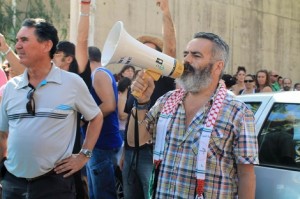
It may be a slow summer; it may be that the world’s media can’t get enough bad news from Spain as the country sinks deeper into depression. In such a context, news editors are particularly susceptible to stories about latter-day Robin Hoods.
Which is what Juan Manuel Sánchez Gordillo, the Communist Party mayor for the last 33 years of Marinaleda, a village near Seville, has been gleefully dubbed after he and groups from the Andalusian Workers’ Union that he helped found went into two supermarkets in early August and made off with trolleys of basic foodstuffs that they said they were going to distribute among unemployed agricultural labourers.
Speaking to journalists after he and his band of merry men and women made off with pasta, oil, bread, and sugar, Sánchez Gordillo said: “Someone had to do something so that there are families who can eat every day.”
Over the years, Sánchez Gordillo has led innumerable strikes and land seizures – direct action as part of his commitment to protect the interests of the rural poor. The plight of rural communities has been under-reported as Spain’s economy spirals deeper and deeper into recession, but few of them will have benefitted from the construction boom that stoked the economy for more than a decade until 2008: around one in three families in Andalusia lives in poverty, and the region has a much higher unemployment rate than the national average of 25 percent.
Shortly before his well-publicized supermarket heist, Sánchez Gordillo had already hit the headlines after the Civil Guard dispersed activists he was leading from land owned by the armed forces at a base called Las Turquillas. He points out that the army only uses 20 hectares of the 1,200-hectare property, and the activists want to open up the rest for public use as agricultural cooperatives.
Sánchez Gordillo also led a mass occupation of the Palacio de Moratella, owned by the Duke of Segorbe, who receives EU farm subsidies for land that lays idle.
In Palma de Río, in Córdoba, members of the Andalusian Workers’ Union have been occupying 400 hectares of unused land, and have begun working it.
They have taken up the slogan “la tierra para el que la trabaja”, a call to arms dating back to the days before the Civil War, and which translates as “land for those who work it”. These days labourers have taken their inspiration from Sánchez Gordillo’s own village of Marinaleda, where he decided back in the late 1970s to occupy unused land and work it. More than three decades later, the community is one of the few in the area with full employment.
Surrounded by olive groves, Marinaleda operates a farming cooperative of 2,650 people. Close by is a farm that produces labour-intensive crops such as artichokes, hot peppers, broccoli and broad beans, as well as wheat.
Bucking the trend
Marinaleda is an exception to the current housing crisis. The town council has prohibited the building of properties for speculation, instead encouraging people to build their own homes, and guaranteeing low rents for those who cannot afford to.
Sánchez Gordillo grew up in a radical tradition that has largely been forgotten by his own Communist Party, and completely discarded by the Socialist Party, which built up a power base in Andalusia in the 1960s and 1970s. When the Socialist Party took office in 1982, wealth inequality in Andalusia was among the sharpest in the country, with just two percent of the population owning 90 percent of the land, much of it left idle. The situation has improved to some degree, but figures like Sánchez Gordillo are here to remind us that there are still profound structural inequalities in Spain more than three decades after the death of General Franco and that the landed gentry who supported him during the Civil War, and whom he rewarded afterwards, still hold considerable sway.
The 15-M, or indignados, nationwide grassroots protest movement has also thrown its weight behind the agricultural labourers’ fight. Although the 15-M is largely based in Spain’s cities, working at neighbourhood level, it is increasingly finding that rural communities such as that led by Sánchez Gordillo are receptive to its share and share alike philosophy: little wonder, they’ve been living the communal life for more than three decades.
Leave a Reply
You must be logged in to post a comment.